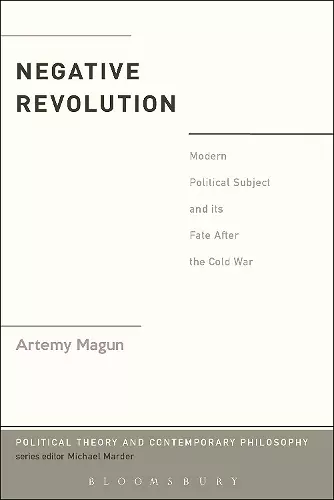Negative Revolution
Modern Political Subject and its Fate After the Cold War
Format:Paperback
Publisher:Bloomsbury Publishing PLC
Published:19th Dec '13
Currently unavailable, and unfortunately no date known when it will be back

This Political Theory and Contemporary Philosophy series volume develops the theory of negative revolution by analyzing recent political events and the philosophical concept of negativity.
This thought-provoking work analyzes concrete political events and reinterprets key concepts in modern political science. Building on the works of Kant, Badiou, Adorno, Hegel, and more, it posits that the dynamics of revolution can be encapsulated in the concept of negation, since a revolution essentially negates "what is" by rejecting the power in place. The work argues that revolution is the true ground of Western democracy and that the proof of a true democracy is the activity of protest movements. It discusses how modern philosophy conceives political truth as revolutionary or eventful, and that one aspect of revolution is negativity, which fluctuates between inertia and melancholia. It examines the problem of revolution in the context of modern philosophy, providing a diagnosis of the historical developments since the fall of the Soviet Union to the Arab Spring, setting forth an original theory of revolution while shedding light on the notion of negativity in contemporary thought. This innovative work will appeal to anyone interested in political theory and political philosophy.
The Negative Revolution convincingly diagnoses the melancholia of our present moment as a symptom of revolutionary negativity gone awry. From Kant to Badiou, weaving together philosophy, politics, and poetry, Artemy Magum confronts us with the demand to rehabilitate negativity to transform this melancholia into new revolutionary possibilities. * Benjamin Noys, author of The Persistence of the Negative (2010) *
Artemy Magun’s erudite and original philosophical reflection on revolution and negativity comes at an important critical historical juncture to illuminate the meaning and possibilities of emancipatory politics from South to North and from East to West. The Negative Revolution is a highly innovative account that offers new resources for understanding important contemporary popular practices of resistance and insurrection that escape standard conceptions and theories. Equally important, it has the virtue of historicizing these practices by situating them in relation to post-Cold War transnational forms of power and mobilization. Magun’s splendid book is simply indispensable to those who wish to rethink revolutionary politics in a truly philosophical fashion that challenges both the normative idealization and the empirical cynicism built in all classical writings on the subject. * Andreas Kalyvas, Associate Professor of Politics, New School for Social Research, New York *
Revolution comes to us from Russia, again. Artemy Magun, writing from Saint-Petersburg, calls it 'negative,' in order to show that it is open to a transgression, to a transcendence, and to a transvaluation of itself. This book works above all to hold in check the melancholia of today's 'developed' societies. Such a book is long awaited. It’s a must read. * Jean-Luc Nancy, Emeritus Professor, University of Strasbourg, France *
Magun’s deep investigations of logical, linguistic, and philosophical negativity are an important corrective to theoretical over-emphasis on affirmation. Rather than celebrating multiple modes of becoming, Magun attends to multiple dimensions of negation: contradiction, contrariness, privation, foreclosure, repression, disavowal, and so on. … Magun’s theory of negativity provides a conceptual apparatus for theorizing modernity under the sign of climate change. -- Jodi Dean, Hobart and William Smith Colleges, USA
ISBN: 9781441168085
Dimensions: unknown
Weight: 464g
288 pages